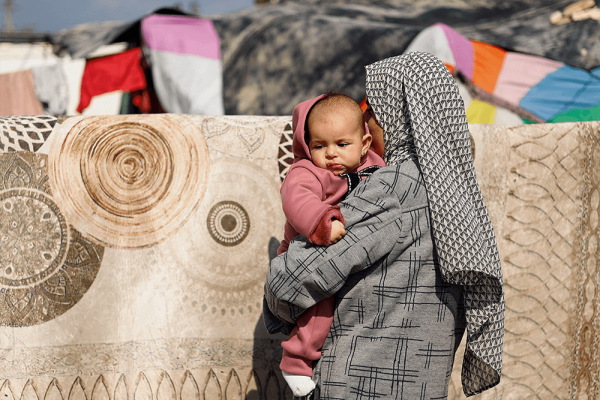Earlier this year, I was arrested alongside more than a hundred other Mennonites in Washington, D.C., as we raised our voices in song, demanding that our elected officials call for a cease-fire in Gaza. Being a part of this act of peaceful civil disobedience, organized by Mennonite Action, gave me a sense of clarity about my faith that I had sought for years. As Capitol Police officers zip-tied my wrists behind my back, I sang louder and thought to myself: “This is what it means to be a Christian. This is what pacifism meant to my Mennonite ancestors.”
On the morning of Jan. 16, after two days of community building and training, hundreds of people gathered in the basement of Washington City Church of the Brethren. The air was buzzing with excitement as we connected with old friends, ate breakfast, and prepared, spiritually and logistically, for the day.
Just before noon, we made our way through snow and ice to the Cannon House Office Building, where we went through security and milled around the rotunda like tourists. Once we were all there, we sat down in concentric circles with song leaders standing in the middle, unfurled our banners, and began to sing in four-part harmony:
“Lord, listen to your children praying / Lord, send your spirit in this place / Lord, listen to your children praying / Send us power, send us love, send us grace.”
Our banners, painted to look like quilts, read “Mennonites for a ceasefire,” “Let Gaza live,” “Send food not bombs,” and “Free all hostages.” Outside the building, about 200 more Mennonites were gathered in the bitter cold, singing hymns and holding quilts and signs of their own. All of us were there because our faith compelled us to speak out against Israel’s killing of thousands of civilians in Gaza, a campaign financed and supported by our own country. Over 30,000 people have died in Gaza, either directly killed by the Israel Defense Forces or because of inadequate access to medical care, food, and water caused by Israel’s ongoing blockade.
What is Mennonite Action?
I first heard about Mennonite Action in the way many Mennonites hear about Mennonite things: word of mouth. A college friend’s brother named Adam Ramer was starting an organization in the vein of the advocacy group Jewish Voice for Peace, a group I have admired since Oct. 7. Ramer’s name had made the rounds in Mennonite circles after he publicly quit his job as the political director for California Rep. Ro Khanna’s (D) reelection campaign, after Khanna refused to call for a cease-fire in Gaza. (In November 2023, Khanna changed his position, becoming quite vocal about calling for a cease-fire.)
Ramer started Mennonite Action alongside Nick Martin, a grassroots organizer based in Lancaster, Penn. The two had met in 2020, working for Bernie Sanders’ presidential campaign. After Oct. 7, both Ramer and Martin had independently gotten involved with JVP and IfNotNow, appreciating how the two organizations were deeply grounded in their Jewish faith and theology. They wondered what it would look like if they activated their own faith tradition.
Martin told me that they started by brainstorming movement principles grounded in Mennonite values and theology, then made a simple website inviting people to an organizing call. They were amazed when more than 800 people attended that first call on Nov. 28, where they announced plans for a “Mennonite Day of Action” on Dec. 19. They envisioned Mennonites across the U.S. and Canada arriving at their elected officials’ local offices unannounced, singing hymns, sharing stories, praying, and asking that their officials call for a cease-fire.
Could Mennonites be convinced?
While I was excited by the potential of Mennonite Action, I was also skeptical that their plan would work. Would a bunch of young activists really be able to convince Mennonites to do this? Mennonites,who often feel uncomfortable with direct, visible action? Mennonites who would rather swoop in with aid after the violence has ended or have academic discussions about it?
Being a Mennonite has always been an essential part of my identity. Growing up, I was surprised to learn that my friends in other denominations didn’t sing hymns in four-part harmony and saw serving in the military as an extension of their faith, not something in direct opposition to it. I was proud to be part of a historic peace church, which I viewed as exceptional (ironic, since Mennonites are supposed to be humble).
But as I got older, I started to feel disenchanted with the church body that I had once idealized. I was angry that my denomination couldn’t be bolder and more prophetic on LGBTQ+ inclusion and racial justice. I began reckoning with our history of fleeing when faced with violence: For years, I had conceptualized the Mennonite diaspora as a group of people perpetually displaced, but I came to realize that most of the time, when Mennonites left one country for another, it was by choice, a strategic move in order to avoid bearing arms. Maybe most of my ancestors never wielded a weapon, but more often than not, they had the privilege not to.
It also became harder to reckon with harmful parts of our history: Mennonites were involved in residential schools in the United States and Canada. Mennonites supported Nazis in Germany. Mennonites have perpetuated and covered up sexual assault and abuse scandals. As I learned more about Mennonite involvement with Nazis, I wondered if it was even okay for Mennonites to speak up against Israel before we have collectively reckoned with and apologized for our antisemitic past. How could we act with integrity when there is so much unresolved harm? Mennonite Action’s vision seemed promising, but I worried that a Mennonite response to the genocide in Gaza might fall short.
I was pleasantly surprised to be proven very wrong.
Over 1,800 Mennonites in 42 different locations across the U.S. and Canada showed up at their representatives’ offices on December 19. Mennonites in my area went to Rep. Glenn Ivey’s (D-Md.) office and were able to meet with him. In Madison, Wisc., two days after 30 Mennonites gathered outside of Sen. Tammy Baldwin’s (D) office asking for her to publicly call for a cease-fire in Gaza, she released a statement doing just that.
Less than a month later, I was being patted down by a Capitol Police officer, my hands zip-tied, singing until my voice was hoarse, the songs I’ve been practicing every Sunday since I could read. I felt completely unafraid — not of singing in public, not of the police, not of getting arrested. I was buoyed by a community of people whose names I didn’t even know. I realized that only a few of us had started the day completely fearless. The vast majority of us had been scared but showed up anyway, encouraged by the community we had formed. Together, our fear became smaller.
What Mennonite Action is doing is just a small part of the greater movement for a permanent cease-fire in Gaza and justice for Palestinians. The war in the Middle East is spreading, not slowing down, and the U.S. is ramping up its involvement. Israel is rejecting any cease-fire negotiations, even as the families of Israeli hostages beg their government to rescue their loved ones. Israeli settlers in the West Bank have gotten more violent, emboldened by the lack of media attention on the region. While 69 members of Congress have called for a cease-fire, the consensus remains in American politics that Israel has a “right to defend itself,” even if that means committing war crimes and not prioritizing the hostages they claimed to be fighting for.
Mennonite Action is hosting another mass call on Feb. 29 to organize a “week of action” in late March. The road ahead is unclear, but we know we must keep going, even if we have to clear our own path.
Mennonite Action’s January demonstration was the largest Christian-led, public action calling for a cease-fire to date. I hope that we lose that title soon. As so many Christians vocalize their support for Israel, those of us who promote peace must take visible public action against the violence in Gaza to show that our faith compels us to dream of a different future for all people in Palestine, Israel, and beyond.
Got something to say about what you're reading? We value your feedback!








